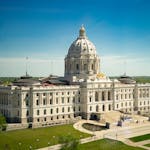Over this past summer, I met with virtually every homeowner who lives directly along Lake Calhoun, plus another couple hundred neighbors who live within a few blocks. Why? To listen to what they had to say about the renaming of Lake Calhoun to Bde Maka Ska. The results were surprising.
About 20 percent of the people I met told me that they feel that the name Calhoun is problematic and that they'd like to see a "more inclusive" name.
Surprisingly, they feel that there is nothing inclusive about the name "Bde Maka Ska." They are upset that American Indian activists seem to have hijacked the discussion and that public officials have not made a bigger effort (and process) to enroll the entire community in a discussion about what alternative names are "more inclusive" than Lake Calhoun.
These people raised a good question: What exactly have the Dakota Indians done that is a positive contribution to all Minnesotans? What is the heroism or accomplishment that we are recognizing in order to justify renaming the lake to Bde Maka Ska? Unfortunately, nobody had any answers.
Fortunately, I also met eight people who specifically supported the name Bde Maka Ska. This was an interesting group. With the exception of one person, they were angry at the "white establishment" and felt that we Minnesotans need to atone for history's wrongdoings. Ironically, none of them was able to provide specifics of what exactly we needed to atone for, other than "Calhoun was racist and we stole all of this land from the Indians."
The remaining 80 percent of the people whom I met had a diverse range of reasons for not wanting to change the name of Lake Calhoun, period. They were overwhelmingly disgusted that public officials were spending all of this time and energy on the lake renaming issue when there are so many other pressing problems facing the community that need to be addressed.
But this response didn't explain the reason for preferring to retain the name Lake Calhoun.
So I pushed for a better explanation. It turns out that most of them don't feel that Lake Calhoun represents an endorsement of slavery or racism, but that it is merely the name that has been used for more than a hundred years for one of Minnesota's iconic lakes. They view Lake Calhoun as a brand, similar to how Yellowstone National Park is a brand; both locations have millions of visitors and the brands are well-established. Some people added that Lake Calhoun has no problem with inclusivity; just look at the fantastic ethnic diversity that hangs out around this lake all summer long, having a great time. Last, a surprising number of people feel it's unfair to change the name of the lake when so many local businesses have built their brands around Lake Calhoun, such as Calhoun Village, Calhoun Beach Club, Calhoun Sailing Club, Calhoun Square and so forth.
By summer's end, I had finished this fascinating social experiment of introducing myself to 350 neighbors and listening to their opinions about the renaming of Lake Calhoun. My wife thought that I was nuts and that people were going to chase me out of the neighborhood, but thankfully that happened only once. More important, I am grateful to be able to share with the entire community this composite picture of how the people who live near Lake Calhoun feel about this issue.
Tom Austin is CEO and managing partner of the F2 Group, a venture capital and private equity firm in Minneapolis.
![A windsurfer on Lake Calhoun Wedneday afternoon. ] JEFF WHEELER ï jeff.wheeler@startribune.com The Minneapolis Park Board will take its final vot](https://arc.stimg.co/startribunemedia/DEAZKV2ARAWEMMPF64WDASZNIQ.jpg?fit=crop&crop=faces&w=550&&auto=format)




